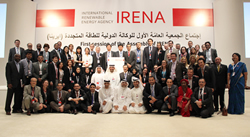The first session of the Assembly of the International Renewable Energy Agency (IRENA) included: a High Level segment, during which a number of delegates addressed issues related to climate change; and a Ministerial Round Table, to discuss the strategic needs for a clean energy future.
 6 April 2011: The fifth session of the Preparatory Commission for the International Renewable Energy Agency (IRENA) and the first session of the Assembly of IRENA were held from 3-5 April 2011, in Abu Dhabi, United Arab Emirates (UAE). The Assembly was the inaugural meeting IRENA’s governing body, and was attended by 950 participants, including one Head of State, over 50 ministers, 30 ministerial-level officials, 670 country delegates, 130 observers and officials, and 70 accredited media.
6 April 2011: The fifth session of the Preparatory Commission for the International Renewable Energy Agency (IRENA) and the first session of the Assembly of IRENA were held from 3-5 April 2011, in Abu Dhabi, United Arab Emirates (UAE). The Assembly was the inaugural meeting IRENA’s governing body, and was attended by 950 participants, including one Head of State, over 50 ministers, 30 ministerial-level officials, 670 country delegates, 130 observers and officials, and 70 accredited media.
Agenda items included the provisional rules of procedure of the Assembly and of the Council, election of the members of the Council, designation of the permanent seat of the Agency, selection of the permanent emblem of IRENA, host country agreements, proposed work programme and budget for 2011, and appointment of the IRENA Director-General. Based on the deliberations within the Preparatory Commission for IRENA, which took place on 3 April, Adnan Amin (Kenya) was sworn in as Director-General, for a term of four years. The Director-General was authorized to sign agreements regarding a host country agreement for the IRENA Innovation & Technology Centre (IITC) office in Bonn, Germany, and revision of the host country agreement between the UAE and the Preparatory Commission to reflect the transition from the Preparatory Commission to the Agency.
On 5 April in the morning, a Ministerial Round Table was held in parallel to the meeting of the Assembly to discuss the strategic needs for a clean energy future. During the high level segment of the first session of the Assembly, which took place on 4-5 April 2011, various speakers addressed issues related to climate change. The Republic of Korea underlined that fossil fuel depletion and climate change call for a paradigm shift towards green growth and renewable energy. Samoa, Grenada, Kiribati and Fiji said addressing climate change is a matter of survival for small island developing States (SIDS), stressing the need for access to affordable renewable energy. Benin and Bhutan underscored their vulnerability to climate change. Rajendra Pachauri, Chair of the Intergovernmental Panel on Climate Change (IPCC), stressed the importance of renewables for climate change mitigation, calling for the dissemination of the findings of its upcoming Special Report on Renewable Energy Sources and Climate Change Mitigation. Algeria underscored the vulnerability of Africa to climate change and, together with Peru, identified the deployment of renewable energies as one solution. Bhutan indicated her country’s commitment to reduce greenhouse gases (GHGs), in particular the development of hydropower through the Clean Development Mechanism (CDM). Myanmar emphasized the importance of the deployment of renewables in the face of the depletion of fossil fuels and climate change. [Meeting Website] [IISD RS’ Earth Negotiations Bulletin coverage of IRENA PrepCom and Assembly]